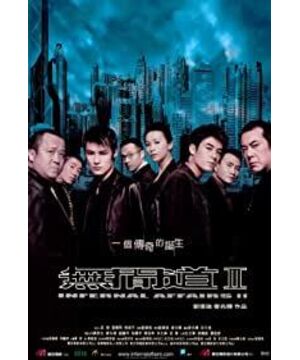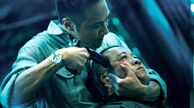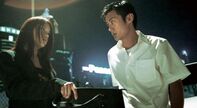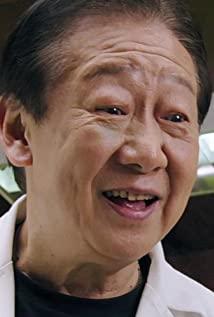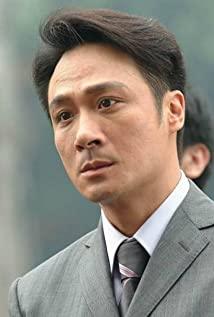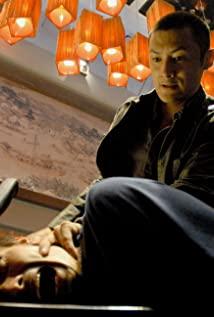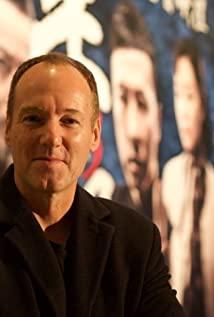Summary
Hong Kong films have undergone drastic changes in the 1980s. The short-lived New Wave movement is like a white horse. Most of the new wave directors even Lu Zhengrong, and soon turned into the creation of mainstream movies. Tired by the box office, the vanguard consciousness has been greatly reduced, but compared to the Hong Kong experience that emphasizes practical results, this seems to be the path that the new wave should take. It is in this era that Hong Kong has formed unique genres of movies, among which gangster movies and gangster movies are even more noticeable. "Infernal Affairs" with his complex narrative and super strong cast has made a shot in the heart of Hong Kong film's extremely downturn. And it stands out in traditional gangster movies and police and criminal movies, leading to a series of follow suits. The analysis of the characters and story content in "Infernal Affairs" 2 reflects the best and worst decade of Hong Kong since 1991.
Keywords: Commercial, Police, People, Time, Movies
, "Infernal Affairs" from Hong Kong
-A Brief Talk on "Infernal Affairs" 2 The
preface
every time I mention "Infernal Affairs", I think there are many. This is a trilogy, this is a trilogy of stars, this is a trilogy with grand narrative, this is a trilogy that saved the Hong Kong film scene. In fact, in my opinion, the simplest and most important thing is that this is a trilogy that has been successfully branded with Hong Kong.
When the first film of "Infernal Affairs" was released, I was in high school. I thought it was a great movie because of Andy Lau, Tony Leung, Huang Qiusheng, and Zeng Zhiwei. In the meager amount of movie watching at the time, these cast members felt the success of the movie, and at the same time felt the twists and turns of the whole movie. When the "Infernal Affairs" trilogy is all shown in front of the audience, it still feels the same as the first one. In high school, the feeling of the "Infernal Affairs" trilogy can be summarized as an "epic" movie with a word that describes a movie in the book. Later, I learned that the term used to describe Hollywood blockbusters like The Lord of the Rings, but when I really started to analyze "Infernal Affairs" and analyze all aspects of "Infernal Affairs", I thought of Hong Kong, thought of Hong Kong movies, and thought of Hong Kong. In that decade, the best and worst decade, I thought of Hong Kong’s economy, Hong Kong people, and all aspects of Hong Kong, and realized that all these ideas were brought about by a trilogy. So I think "Epic" can be used to describe "Infernal Affairs".
From high school to university, from university to about to graduate, from high school student to college student majoring in radio and television director, from college student major in radio and television director to a college student who is about to find a job, a lot has been experienced and changed a lot. The understanding of film, The understanding of "Infernal Affairs" has also changed a lot. In this best and worst age, everyone is changing, and everyone has his own label. Liu Jianming and Chen Yongren in the play are like this, Andy Lau and Tony Leung outside the play are like this, and we are the same. Everyone around is like this, everyone has reincarnation, everyone walks on their own path, and everyone has a seamless feeling, because everyone, whether you are a good person or a bad person, has happiness and pain. There must be moments of struggle and pain, so that you will fall into the world of infinitesimals, and you will have the desire to get rid of the world of infinitesimals. In this way, 21 various characters of infinitesimals such as Liu Jianming, Chen Yongren, and Han Chen are born. Bit by bit has constructed this "epic" "Infernal Affairs". On the basis of traditional Hong Kong gangster films and gangster films, Wu Jian 2 showed a magnificent Hong Kong decade, especially the sensitive and turbulent era from the early 1990s to 1997, which can better reflect the close connection between Hong Kong movies and Hong Kong society.
A essay, a ten-page essay may be a detailed analysis of a movie, but movies are not all, let alone when a director wants to use a movie to carry a society, it is impossible for us to analyze him To interpret him, we can only watch and use our own ideas to accept the director's indoctrination.
One factor for the vitality of Hong Kong’s film industry.
First of all, of course, it is related to the continuous development of Hong Kong’s economy. Especially since the 1960s, Hong Kong has gradually developed from a half-central, half-western, half-new and half-old re-export trade port to an independent industrial and commercial sector. Large cities entered unprecedented prosperity in the mid-1970s, with a developed economy and a large number of investors, which played a role in safeguarding the development of Hong Kong films.
Second, in Hong Kong, movies have always been a major form of entertainment for the public. Although the rise of television, video recording and other forms of entertainment have had a certain impact on movies, they have not caused as great a blow as the mainland and Taiwan. This is certainly related to the public's entertainment psychology and consumer psychology, but more importantly, it should be attributed to the efforts of Hong Kong film workers. Hong Kong film workers, especially directors, often have a "sense of crisis." They attach great importance to maintaining and expanding their audience. Therefore, they understand very well that once they are alienated from the audience, it is difficult to bring them back to the cinema; and once they really lose the audience, they and the film also lose their place to live. Therefore, they often study the needs of the audience, study the mood of the public, and try their best to adapt their production to it.
Hong Kong's economy and film industry in the
1990s After the 1990s, due to the fluctuations in the popularity of Hong Kong society and the impact of the Asian financial crisis, Hong Kong's economic development has shown signs of decline. In this general environment, and due to the many problems of Hong Kong film itself, its film industry has experienced an unprecedented downturn. In order to find a bailout, the Hong Kong SAR government and Hong Kong filmmakers are actively working hard, and the central government has also given strong support. In the Hong Kong film industry model, the traditional large-scale factory system and the "satellite system" and theatrical marketing model have all died. In addition to co-production with the mainland, there have been industrial reorganizations, united new media industries, and other types of individualization. Characteristic new industry model. While the industry tends to be individualized, its aesthetic level also shows stylistic features, breaking through the streamlined commercial genre production model of the boom period, indicating that Hong Kong films have entered a new era after undergoing the test of major social changes. .
3. Hong Kong Police Films
Police films, also known as police and criminal films, focus on how the police subdue criminals who commit crimes. The output is the top of the list, the sales rate is very high, and there are often excellent works. The position of the police and the gangsters in society is clear. The police represent justice and the gangsters represent evil. This is beyond doubt. However, in social reality, the police do not necessarily perform honestly and perform their duties without humiliating their mission. They may also corrupt the law and commit crimes with criminals. However, they cannot investigate illegal police or resort to law without evidence. Even if the police completely abide by the law, they may not be able to rule out the cunning and suspicion of the citizens. It can be seen from this that there are some things in society that are very helpless, exist but cannot be solved by the existing laws, so they are moved to the screen to allow people to imagine and think in the face of images. In short, the police deal with the relationship between law enforcers and society. It shows people's requirements and vigilance towards law enforcement. It shows the various possibilities of law enforcement officers in the execution of official duties. In Hong Kong movies, police are basically divided into two types: good police and bad police. The good is so good that it can't be added, and the bad is so bad that it can be pointed out. They are all extremes.
Another type of film is dedicated to depicting the undercover policeman in a gang of gangsters. His identity has two sides. On the surface, he is a gangster, but he is actually a policeman. The climax of this kind of movie is that the undercover police breaks into the bandit's nest regardless of personal safety. After repeated tests, they gain the trust of the bandit leader, and then destroy the bandit's nest in one fell swoop. This kind of film exaggerates the dilemma of the undercover police, and the misunderstood, well-intentioned grievances, and may also satirize the fact that Hong Kong police and gangsters are actually the same thing. It is difficult to distinguish between Hong Kong and British police. Hong Kong people are not at ease with Hong Kong and British police.
Four "Infernal Affairs" police
The focus of the police film is on the characters, and the focus of "Infernal Affairs" is also on the characters. Each character has a long time and struggles on the road. Let me talk about the overall characters first, the characters in the "Infernal Affairs" trilogy are difficult to divide by simple "good guys and bad guys", their characters are more complex and their images are fuller. The director got rid of the worship of god-like heroes and the understanding of magic villains, and really positioned the role modeling on "people". Besides the police, Chen Yongren's ambition was to be a policeman since he was a child. When it was discovered that he was the brother of the gang boss Ni, he faced the dilemma of being expelled from the police academy. Police officer Huang Zhicheng seized his determination to become a policeman and threatened him to force Ren to be an undercover agent, betraying his brother Ni Yongxiao as a condition to keep him as a policeman. Faced with the temptation, Ren agreed without hesitation, and since then, he has embarked on a dilemma. According to Ren's words: "The undercover agent is to betray the people around him." On the one hand, it is his determination to be a good person. On the other hand, he conspired with Huang to betray his elder brother Ni Yongxiao, who trusts and loves him. Can he be considered a good person? No, though, he is not a bad guy either. Although the struggle between good and evil in human nature has become secondary here, the director is concerned about the mental state and sense of oppression of people in such a contradictory position of this task. It is definitely the first time in the history of Hong Kong gangster movies to create a character image by going deep into the inner and spiritual level of the character, and this creative idea is more obvious in shaping the role of Liu Jianming.
Five "Infernal Affairs" 2 story summary
Speaking from 1991, at that time, the Ni family was firmly seated in the leading position of the gangster in Hong Kong, and five bosses under its control controlled different regions. But the leader Ni Kun was suddenly assassinated. That night, the four leaders took advantage of the chaos to wait for the opportunity to betray and attack, and only the newly promoted Han Chen remained loyal to the Ni family. Inspectors of the crime team, Huang Zhicheng and Lu Qichang, also deployed closely to prevent the situation.
Ni Yongxiao, the second generation of the Ni family, is a seemingly unremarkable accountant who is extremely deep in the city. Unexpectedly, with his own power, he restrained the four leaders and became the new leader without a single soldier. Huang became wary of him and sent Chen Yongren, a police school student, to drop out of school on the grounds of poor composition, and infiltrated the Ni family for a long-term undercover plan. When Lu learned that Ren was Ni's half-brother, he strongly opposed it, but his friend Huang still insisted on going his own way. On the other hand, in order to consolidate his power, Han had already arranged for Liu Jianming, his subordinate, to be admitted to the police department to inform the police.
Three years later, Ren gained Ni's trust and held important positions in the family. Ming also soared in the police force with the help of information provided by Han. Ni's career has been smooth sailing and his social status is improving day by day. The ambitious he decided to get rid of the top five bosses, so that he can sit back and relax. The four bosses were killed at the same time overnight, and Han Yi's life and death in Thailand is unknown.
Ni Cha found that three years ago, MARY colluded with the police Huang to plan the assassination of Ni Kun in order to help the upper ranks of Han, and sent someone to cause a car accident to kill her. Ni Yi targeted Huang to retaliate, but made Lu Yin a surrogate for the dead by mistake. Huang Tong lost a friend and was investigated by the police internally about Ni Kun's killing, and he decided to fight back against Ni.
In 1997, Huang found South Korea, who was lurking in Thailand, and the two sought cooperation. Han promised to return to Hong Kong as a tainted witness to testify against Ni's crimes that year, causing Ni's status to collapse overnight, and the parties fought fiercely again, and Ni Jun died tragically in the arms of benevolence. South Korea’s temperament has changed drastically in Thailand, and the methods are far more fierce than Ni. Huang Zhi’s bane has been planted by his own hands, and he will try his best to track down Han in the future. As a result, Ren also sneaked into Han to continue his undercover work.
Six Characters and Inner
Moods Han Chen——"Master said that I am a master of success, but I don’t agree! I choose my own way.....
Why is Han so cunning and unscrupulous? It is described in Part 2 He was originally a small person who was loyal to the boss Ni Yongxiao, but was repeatedly tricked and had to be pushed by his wife Mary to the position of the gang boss. The most thought-provoking shot: A minute ago, Han Chen looked at Mary's The picture was heartbroken, he put this photo into his arms, no, in his heart, he opened a glass door in front of him, and outside was a banquet scene with laughter and laughter.He raised his wine glass to join the crowd-his life changed Now, he has walked towards the endless path of no return.
Huang Zhicheng-"What do you think of me as a person"
The image of Superintendent Huang broke people's general understanding of the "high, big and complete" of the police. The police also have selfishness, and the police are not perfect. He used undercover to investigate the inside story of the gang, causing gang revenge and reaping the profit, but he lost the most. A good comrade-in-arms, he is a tragic character from beginning to end. Huang Zhicheng is not yet the boss, he is very capable and sincere, but also very fragile. Put yourself in a position of opposition to the world, and then wither from the impact again and again. From the beginning of the movie, the first time you shot but didn’t kill the little gangster, it shows that Huang Zhicheng’s still hasn’t been finalized yet. The un"hardened" righteous character corresponds to the middle-aged Han Chen sitting across from eating with relish, one immature justness and another immature sleek.
Ni Yongxiao-"Get out and run, no matter what you have done, sooner or later you will have to pay it back."
Ni Yongxiao explained the theory of karma with his own actions. His father's death aroused the intensification of internal conflicts in the gang. The call resolved the fierce offensive of the four generals, and then developed silently. In the year of 1997, the four generals who wanted to conspire were resolved one by one. The methods were clean and unrestrained. He was merciless to the enemy, but caring for his family. Beizhi. He wanted to abandon evil and do good, but he was obstructed by the police. In the end, he ended up dismal. He said his own karma. Ni Yongxiao is an extremely deep but ordinary person. All the plots and killings in his eyes are only the question of whether to "execute" it, like whether to eat or sleep. He respects and loves his father and loves his family. Make yourself hard to take up all the responsibilities in the family. This person is not a bad person. He just calculates how to take each step, and then see if there are any stones that will stumble on the road he chose. Then kick it away.
Liu Jianming & Chen Yongren-"I didn't have a choice before, now I want to be a good person."
"I'm sorry, I am a policeman."
The conflict between Liu and Chen has shifted from a tit-for-tat match between the first generation to a secret rivalry between the second generation. Travelers, they have no feelings, and they can’t have feelings. When Liu Jianming started to love Mary but was rejected, he hurt the killer and was merciless, in order to maintain his image as a good person-the police. When Chen Yongren watched him helplessly Ni Yongxiao's brother, Ni Yongxiao, died tragically.
mary——"A woman, as long as a man is good, you can do anything!" There is
no need for too many scenes to explain the only female image in this film, precisely because of her most common female greed, in order to make her husband Han Chen stand out. Do not hesitate to provoke the turmoil of the rivers and lakes, without her, there would be no vigorous "Infernal Affairs"!
Seven actors perform
The performance of Huang Qiusheng and Zeng Zhiwei's two old drama bones made the heart bend, making the images of Huang Zhicheng and Han Chen more vivid and three-dimensional; Ni Yongxiao, played by Wu Zhenyu, is the highlight of the film, becoming the signature of the body expression and eyes are replaced by the calm and introverted acting skills See the actor's skill; Hu Jun and Carina Lau played a key role in the transformation of Huang Zhicheng and Han Chen's personalities. Although there are not many scenes, the superb performances of the two have made the audience unforgettable. In terms of supporting roles, the most important role. It is worth mentioning that Liao Qizhi’s third uncle and Zhang Yaoyang’s undercover police have only a few lines of dialogue from beginning to end, but the expressions and actions alone have made the audience unable to ignore their presence. Such robbing is certainly powerful. In contrast, Du Wenze's stupidity is quite satisfactory, and his interpretation of this type of role is too familiar to the audience. I admire Zeng Zhiwei’s performance very much. In my opinion, his performance is the first and has a sense of hierarchy: at the beginning, he was just an errand runner, so he didn’t have any intentions; then the airport bought the Thai for a period, his eyes came out and started. There was a kind of "relentlessness" that didn't exist before; in the end, he tightened the net and went to an appointment alone. Knowing that he was almost certain to die, he let it go. As a result, he had the last laugh. The final knot is life and death, wonderful, two parties, undercover on both sides, and all the exploiters between the police and the robbers all arrived on the scene, it depends on who makes the shot first. This section uses all close-ups and close-ups, and rarely turns the lens. Everyone's thoughts are unpredictable, and all of them are revealed in their eyes. In my opinion, only Zeng Zhiwei's determination and performance are the most effective. Han Chen not only looks shameless, but the only thing he can rely on under the shadow of the Ni family is his sleek cleverness. He was betrayed to take out his courage to fight back from Thailand to Hong Kong and finally put him to death, and later rebelled against the unsaved army of Ni Yongxiao. This blood-red experience was performed by Zeng Zhiwei, who was short and chubby but full of energy, and it was perfectly seamless. At the end of a scene on the phone in the car, the audience realized it from an indifferent "Okay." The hairy Han Chen in the first episode grew up at this time. Wu Zhenyu is worthy of the acting school. His Ni Yongxiao is my favorite character in "Infernal Affairs" II. The most common wear, the most common glasses, and the most common body movements... Wu Zhenyu did not choose to interpret Ni Yongxiao in a neurotic way, but instead used a great love and great cruelty as the central point of the character's inner conflict. In the undercover scene played by Zhang Yaoyang, the tension between Ni Yongxiao, Chen Yongren and the undercover was tightened to an extreme, and the acting skills of Wu Zhenyu and Zhang Yaoyang can best be seen. And Ni Yongxiao, under an ordinary appearance that seems to be a diligent civil servant, he just patiently piles up his own vision step by step. This kind of person is the most terrible. And Wu Zhenyu is such an excellent actor who can maximize the terrible aspects of the role. Shawn Yue’s acting skills finally have a shadow of Tony Leung, but it is far from enough. Although Edison Chen worked hard, but the yin was too heavy, and his temperament was too far behind Andy Lau, but he did not show that Liu Jianming was on the road of endless Feeling over and over again. The supporting roles are well selected. The green leaves of the old actors and actresses set the first half to be brilliant. Jialing’s acting skills are very good, but the role is not enough, and the foreshadowing is not enough, but it is the lack of this role and the importance of the role. Reflects a woman who is not simple in a complicated era.
8. Role Positioning of Infernal Affairs 2
Actually, from the perspective of the characters, you can find the really valuable place of Infernal Affairs II. My own perception is that all the characters that survived in the prequel (the second episode) are in Infernal Affairs 1. They all have completely different faces. From the time of real life, it is like Huang Qiusheng and Zeng Zhiwei are not playing Huang Zhicheng and Han Chen in the first episode. Of course, Yu Wenle and Edison Chen have made intentions with Liang and Liu in the first episode. Huang Zhicheng stood up from personal weakness in the second episode of Infernal Affairs. Han Chen, a calm hero who cannot be shaken by a violent wind and waves, also transformed from a man who had a strong sense of love and righteousness. In order to wipe away the tears, Liu Jianming, the hero who opened the door to welcome his own world, slowly grasped how to make himself more radiant in the police world. Chen Yongren continued to pursue some plausible meanings in life in the street hell. Everything is different from the past, the friends of the past will also become the greatest enemy (Huang Zhicheng, Han Chen).
Nine "Infernal Affairs" 2 from 1991 to 1997 and Hong Kong's 1991 and 1997
Since the end of the 1980s, Hong Kong movies ushered in the era of his peak. This is the "Golden Decade" that Hong Kong filmmakers have cherished so far. Especially in 1992, the total box office revenue in Hong Kong reached 15.72 Hong Kong dollars, of which. The total box office revenue of Hong Kong films reached 1.24 billion Hong Kong dollars, setting a record for the highest annual box office of Hong Kong films. The golden sign of "Oriental Hollywood" is getting brighter and brighter, and the "golden content" of the "Golden Decade" is full of colors. Hong Kong filmmakers are all intoxicated in this prosperous and peaceful atmosphere. In such a prosperous and peaceful atmosphere, the leader Ni Kun was suddenly assassinated. There is a hidden murder in the box office, and a hidden murder in the Hong Kong economy. In the film, some people have already begun to take action, and the road of uninterruptedness has officially begun to walk.
After the "Golden Ten Years", Hong Kong movies seem to have gradually stepped from the hustle and bustle of summer to the dying autumn, and even encountered extreme cold. Hong Kong movie box office has declined year by year since 1993. In 1997, the income of Hong Kong films was only 540 million Hong Kong dollars. In 1999, it even fell to the bottom. The Hong Kong film box office was only 340 million Hong Kong dollars. And this time is the "in full swing" of the Asian financial crisis. The box office and stocks are in chaos. The most fundamental reason for the impact of the box office is the rush to shoot the type, and the fashion of shoddy is prevalent, so there are four big bosses in the movie. Take advantage of chaos and wait for an opportunity to betray and attack. Several key figures are walking nervously and depressingly on the endless road for everyone. People in Hong Kong are so confused that they don't know what their identity is. Before and after the return, people were in panic, everyone was unclear about the future, and every character in the film was even more unclear, wandering in pain on the endless road. Therefore, Ni Yongxiao is taking revenge, Liu Jianming is taking revenge, Chen Yongren is taking revenge, Huang Zhicheng is taking revenge, and Han Chen is taking revenge.
At 0:00 on July 1, 1997, the Special Administrative Region of the People's Republic of China was established. According to the Basic Law, Hong Kong implemented "One Country, Two Systems", "Hong Kong People Administering Hong Kong" and "No Change for 50 Years". In the early hours of Sunday morning, in the torrential rain, Prince Charles took the British Emperor's seat and slowly left the "Pearl of the Orient" that they had ruled for 155 years. When all the dust settled, the heavy rain took away the old dust and also brought new rainwater. So the Ni family disappeared, the young people disappeared, Han Chen matured, and all the people who stayed were mature and wandering on the road of endlessness.
When the new millennium came, Hong Kong’s economy recovered, and SARS disappeared. When Hong Kong people began to reflect on the best and worst decade, they began to think about everything that everyone had in this decade. What kind of role an individual has played in this ten years and what kind of stage is there, there is this "Infernal Affairs" that is very Hong Kong brand.
View more about Infernal Affairs II reviews


